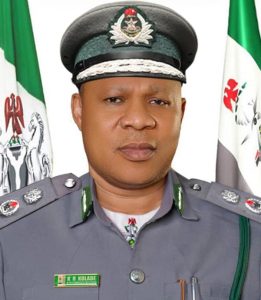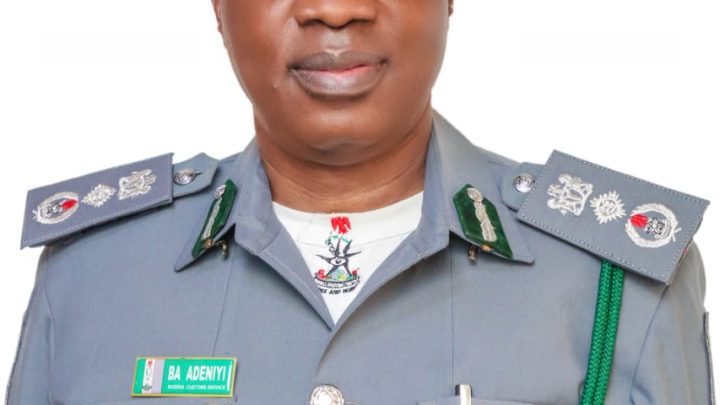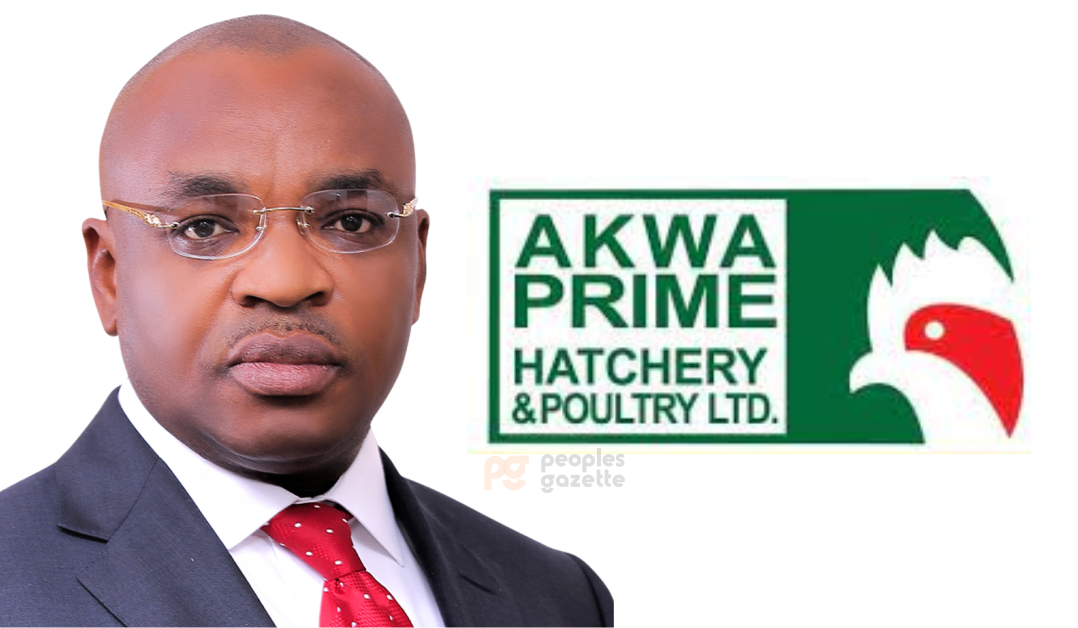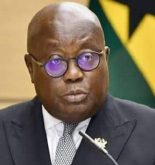By Ibanga Isine
Unmet revenue targets and growing criticism
The Nigeria Customs Service (NCS) and its Comptroller General, Bashir Adeniyi, are under intense pressure amidst revenue target shortfalls and suspected fraud in the agency. The controversy revolves around allegations of a double standard in Adeniyi’s handling of two senior officers implicated in a financial scam involving a whopping N15 billion stowed away in hidden accounts.
Adeniyi is also accused of granting waiver for the over 500 luxury vehicles imported by the National Assembly for its members. Reports by two different whistleblowers within the NCS show that all is not well with the leadership of the revenue generation agency, a situation they feared would seriously affect the economy of the country.
Trouble started sometime in October 2023, when operatives of the Department of State Services (DSS) arrested the Area Comptroller, Federal Operations Unit (FOU) Zone ‘B’ Kaduna, Musa Jalo. At the time, The Daily Times Nigeria had reported how the DSS arrested Mr. Jalo and his personal assistant, simply identified as Umaru for alleged involvement in arms deals. Sources in the DSS had hinted that the FOU comptroller had in a previous arms deal made over N200 million, which was paid into his personal account.
In order to nail him, the DSS operatives disguised as exporters and importers, contacted him and proposed a deal. Unknown to Jalo, who is said to be an expert in cutting deals, he demanded N20 million which the DSS promptly paid into the account belonging to his personal assistant, Umaru. During a sting operation, Jalo and Umaru were arrested by the DSS and detained for further investigation after which they were handed over to the Economic and Financial Crimes Commission (EFCC).

Former Comptroller, Federal Operations Unit, Zone B, Musa Jalo
A source, who cannot be named because he is not authorised to speak on the matter said the EFCC found about N4 billion in the secret accounts maintained by the indicted officer. “He was forced to retire after the EFCC released him but we don’t know whether the commission will still charge him to court,” the source told our correspondent.
Attempts to speak with Jalo on his verified mobile telephone lines were unsuccessful but further investigation showed that his phone with IMEI number 35666376697297 was last used on November 8, 2023. His other phone with IMEI number 35184326237074 was last used on January 2, 2024 at a location close to Transcorps Hilton in Abuja. A whistleblower, however, hinted that the phones might have been seized by the EFCC after he was released on bail and sacked by the authorities of the NCS.
You can also read – Forget second term, set up Covernment of National Unity, Nduese Essien tells Tinubu
The whistleblower, however, expressed disappointment that while Jalo was compulsorily retired by CG Adeniyi, the Comptroller FOU, Zone C, Kolade Kayode, was allowed to return to work after a staggering N11 billion was traced to his secret account with a new generation bank.
According to the whistleblower, the EFCC had arrested Koyode in Lagos in December 2023 after discovering the huge sum in his hidden account. After spending one week in custody, he got an administrative bail in the sum of N1 billion and the EFCC handed him over to the NCS leadership, the whistleblower further said.
Instead of suspending him from duty, Comptroller General Adeniyi immediately reinstated Kayode, a move that could seriously jeopadise the investigation currently being carried out by the EFCC.
Speaking on the issue, a top NCS official said, “Kayode Kolade, the Comptroller, Federal Operations Unit C, Owerri was arrested by the EFCC in Lagos on December 31, 2023 and spent the Christmas holiday in detention. He was released by the first week of January on an administrative bail.

Comptroller, Federal Operations Unit, Zone C, Kolade Kayode
“What is funny about the whole thing is that Jalo, who was the Controller, Federal Operations in Zone B, Kaduna, had a similar situation. Jalo was arrested about three months earlier and detained for five weeks by the EFCC in Kaduna.
“Not long after, he was removed from office and made to go on compulsory retirement. What was found in his account was about N4 billion. What is strange in this case is that, about N11 billion was found in Mr. Kolade’s account with a new generation bank but after all the hullabaloo he has gone back to his office and working. The question now is why is someone who committed the same offence and was locked up and money were traced to his be allowed to come back?”
A source within the EFCC also confirmed that Kayode was arrested by the anti-graft body after a large sum of money was found in the bank account belonging to his family business.
While she did not say how much was found in the account, the EFCC source, however, told GuardPost.ng that the commission has neither cleared nor charged Kayode to court.
Was it really a personal issue?
For weeks, this newspaper has been asking for comment from Jerry Attah, the FOU’s Zone C spokesperson in Owerri. After weeks of delay and excuses, Attah finally admitted that Comptroller Kayode complied with the EFCC’s invitation in December 2023, but claimed that the issue for which the anti-graft agency invited him was personal.
“It is conformed just as you told me that Comptroller Kayode was invited by the EFCC over allegations involving some transactions between the company belonging to his wife and not him. However, he used to be a shareholder of that company a long time ago,” Attah told GuardPost.ng.
He did, however, explain that the zonal comptroller was later released but was not on N1 billion bail, as indicated by an EFCC source who spoke with our correspondent. Continuing, Attah said, “As I speak to you, the EFCC has concluded their investigation but we are yet to receive the official report from them. You must understand that the invitation was on personal grounds and not an official matter. If it was official, they would have written to the comptroller general to invite him.
“Like I said earlier, we are expecting an update from the EFCC. You can also verify from your contacts in the EFCC. He went there and has cleared his name.”
However, the Customs spokesperson for the FOU, Zone B, Kaduna, Nasir Kanawy would not pick calls or respond to messages sent to his verified telephone lines.
Why revenue target can’t be met
Apart from the N15 billion scandal rocking the agency, many senior officials who spoke with GuardPost.ng agreed that the Nigerian Customs Service is unlikely to meet its revenue targets, blaming the situation on corruption, favouritism, and ineptitude on the part of its management under Adeniyi.
“During the last seven months, we were unable to meet our revenue target and nobody was questioned or punished,” one of the sources said. The sources, who cannot be named for fear of punishment insisted that CG Adeniyi lacks the capacity to take hard decisions capable of sanitising the agency, motivating officers and men to deliver their best to meet and surpass revenue targets.
“We are also talking about the ineptitude of the man in charge. As it is now, we hardly make arrests for smuggled goods. Everything is arranged and everything passes through our borders. I wish you can understand the kind of smuggling that is going on. Everything is coming into the country and no one is checking anything.
“Where did they get the guns that were used in killing over 200 in Plateau State? It came through our borders and no one is checking how all these things are coming in any longer. Anything can come in as long as the person will pay.”
This newspaper also learnt that Dende, a man said to be one of the biggest smugglers in the country was arrested a few weeks ago. The notorious smuggler was arrested by operatives from the Federal Operations Units (FOU) Zone A, around Abeakuta/Lagos axis. Not long after, an order to release the man and free his multibillion smuggled goods came from the comptroller general’s office and presto, Dende smiled out of detention.
A senior officer who spoke in confidence to our correspondent lamented the rot within the system, saying, “Currently, officers and men who are doing the right thing are being considered enemies of progress.” The Federal Government set a target of N4.7 trillion, but we only managed to generate N3.2 trillion, resulting in a N500 billion shortfall. Why isn’t anyone asking about the shortfall?
The officer went on to say that the Hameed Ali regime, which ended in May last year, generated around 75% of the N3.2 trillion revenue realised in 2023, and that the Adeniyi-led agency will fall short of the government’s new revenue targets.
“The system is getting so corrupt that they cannot meet the target. It will be worse. That N3.2 trillion recorded was not made by them. A large chunk of it was made under General Ali. They have been in office for about eight months and have been deceiving the president.
“Many of his (Adeniyi) senior lieutenants at the headquarters who would have guided him are confirmed smugglers. One of them was a comptroller in Yola and was allowing tankers with fuel to pass. During a stink operation, they found 40 tankers and he was removed because of that. That character is now at the headquarters and advising the CG. Definitely, they are not going to give him the right advice, one of the sources told GuardPost.ng.
The whistleblowers also complained that Tin Can and Apapa terminals were being run by chief superintendents who are not qualified to handle such responsibilities under the NCS rules. According to them, the operations of the two major terminals should be given to assistant comptrollers and deputy comptrollers.
“They are putting inexperienced people who do nothing except allow everything to go. They don’t understand the job they are supposed to do,” one of the officers said.
Planned revenue targets hike and 500 duty-free luxury vehicles
On February 6, the Senate had raised concerns to the NCS warning that the agency’s 2024 revenue target of N5.079 trillion would need adjustment to prevent further national borrowing. To the public, this gesture might have seemed like a display of genuine concern for the nation’s economic woes. However, investigations by this newspaper unearthed a starkly different reality.
Findings show that the company awarded the lucrative contract to import luxury vehicles for Senate and House of Representatives members had conveniently sidestepped the crucial duty payments for the vehicles. This revelation casts a shadow over the National Assembly’s purported commitment to fiscal responsibility and prudent financial management. It also questions the jumbo perks enjoyed by members of the National Assembly against the pervasive poverty and hunger in the country.
Under President Olusegun Obasanjo’s 2003 monetisation policy, which is still in effect, the government no longer purchases or maintains vehicles for public officials. The policy sought to reduce the burden on public resources generated by the government’s direct provision of fringe benefits to public employees. It entailed converting all fringe perks, such as residential accommodation and chauffeur-driven cars, into monetary terms.
The policy, which has been embraced by successive administrations, was enacted into law as the ‘Certain Political, Public, and Judicial Office Holders (Salaries and Allowances etc) Act 2002’ after it was passed at the National Assembly. However, the recent importation of 500 luxury vehicles for the National Assembly members, amid widespread public outrage, has reignited debate over the application of this law.
It was on the basis of the policy that the National Assembly sold off the Apo Legislators’ quarters in Abuja including the official residences of all the principal officers. It is also the reason state governments do not build official quarters for the leadership of the legislature at that level.
While it is commonly argued that government entities are exempt from paying taxes and duties on goods, the luxury vehicles imported for individual Senate and House members raise pertinent questions. Given their private ownership, it is expected that appropriate duties would have been settled, yet this appears not to have been the case.
You can also read – Robbing Peter to Pay Paul: How Governor Emmanuel Pays Personal Loan with State Funds
This revelation not only calls into question the integrity of the leadership of the National Assembly but also raises concerns about the equitable distribution of financial responsibilities in society. Some Customs officials who spoke to this newspaper said a batch of the vehicles were impounded in Lokoja while they were being brought to Abuja.
“Our officers, who impounded the vehicles in Lokoja had insisted that since they were meant for individual members of the National Assembly, the contractor was bound by law to pay duties on them. It didn’t take long before they contacted the comptroller general and he ordered that the vehicles should be released. How will we meet the revenue target when we allow 500 private luxury vehicles into the country without collecting duties on them,” one of our sources lamented.
The spokesperson of the Senate, Yemi Adaramodu, said he was still inside the chamber when GuardPost.ng contacted. However, subsequent calls and messages through micro-blogging platform, WhatsApp were not answered.
One billion monthly remittance to the Presidency
In another shocking disclosure, whistleblowers inside the NCS have revealed a secret monthly payment of N1 billion to the Presidency. According to sources close to the matter, a high-ranking individual within President Bola Tinubu’s inner circle, who has been embroiled in various financial controversies, is allegedly behind this exorbitant levy imposed on the NCS leadership.
“Someone within the presidency is receiving N1 billion every month from the Nigeria Customs, and as a result, the Controller General is scrambling to fulfill this demand. We are confident that the President is unaware of this situation. The level of corruption within the system has reached such alarming heights that we are unable to meet our revenue targets,” the whistleblower disclosed.
The motive behind the extortion by this influential aide to the President remains shrouded in mystery, raising serious questions about the integrity of the APC-led administration.
Attempts to seek clarification from Ajuri Ngalele, the special adviser to the President on Media and Publicity, were unsuccessful. GuardPost.ng’s efforts to reach Ngalele via his verified telephone line and WhatsApp account were met with silence, till the time of this publication.
When GuardPost.ng contacted Abdullahi Maiwada, the spokesperson of the NCS at the national headquarter in Abuja, he claimed not to be aware of the any of the issues raised by our correspondent.
Mawada, however, referred our correspondent to the spokespersons of the various zones where their top officers were arrested by the EFCC.
Despite numerous attempts to reach Dele Oyewale, the spokesperson of the EFCC, for comment on the cases involving two comptrollers under investigation by the anti-graft agencies, he skillfully evaded our inquiries. Our initial efforts included a phone call followed by a detailed message sent via the micro-blogging app, WhatsApp. Oyewale’s initial response was noncommittal, stating that he would revert to our correspondent.
However, days turned into weeks, and Oyewale remained elusive. It wasn’t until we persisted with more phone calls that he accidentally answered, promising to provide the necessary information the following day. True to form, the next day came and went, with no word from him. As the days stretched into weeks, Oyewale’s avoidance tactics became apparent. Despite ignoring our calls, he had meticulously read all the messages we had sent him on WhatsApp, as indicated by the two green ticks on the app.
Final lines
As interested parties and the public await further developments, the NCS is at a crossroads, grappling not only with financial challenges but also with questions of ethics and governance. The unfolding saga calls for broader conversations about the effectiveness of revenue-generating agencies and the need for stringent oversight to maintain public trust.
The controversy surrounding Adeniyi and the accused officers adds another layer of complexity to the larger narrative of financial management within government institutions. The coming weeks are expected to shed light on how the NCS, under Adeniyi’s leadership, will navigate this challenging terrain and restore confidence in its ability to fulfill its crucial mandate.




